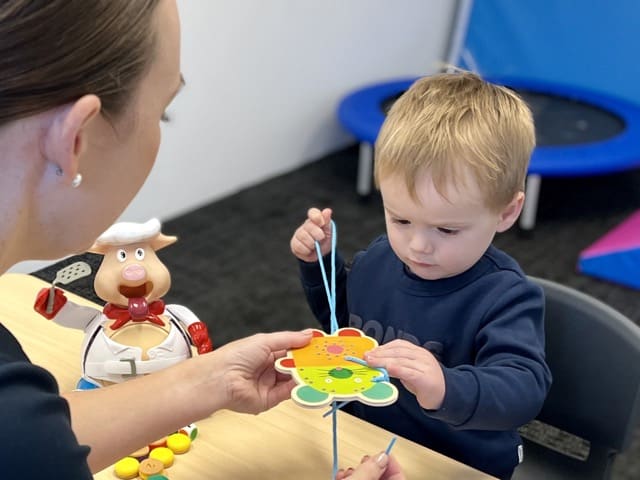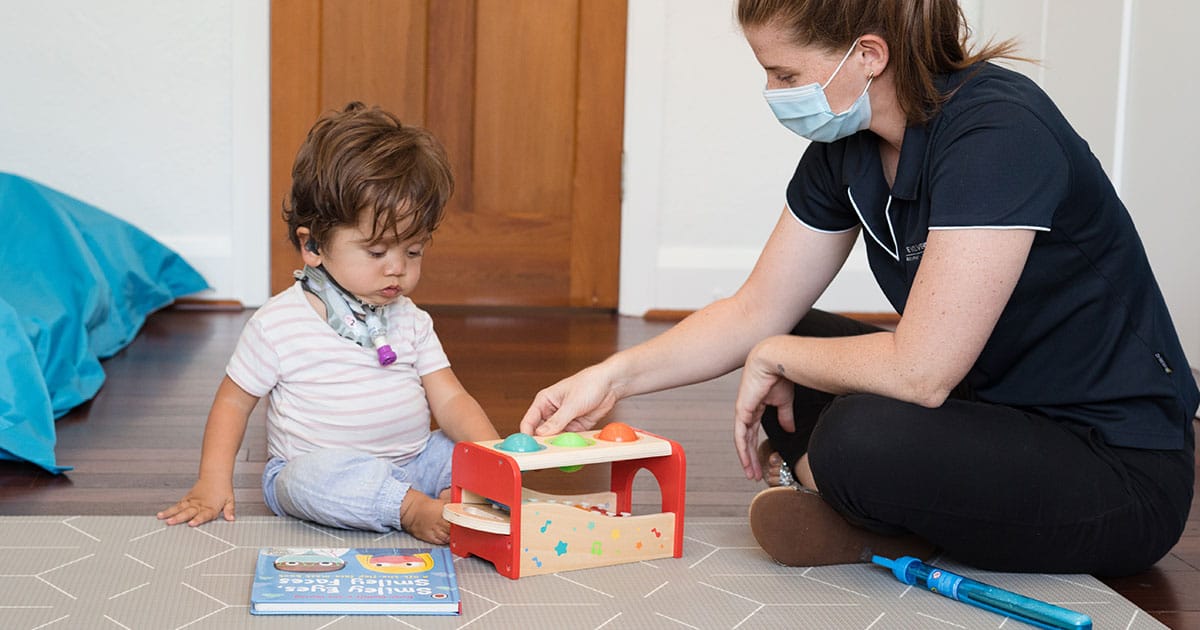Children’s Occupational Therapy Perth
We provide NDIS registered Occupational Therapy supports to Perth children of all ages

What is Children’s Occupational Therapy?
It’s approaches, methods and interventions that work to assist and support children with everyday activities. It may involve tasks at home like eating, dressing and self-care or activities at home and around Perth such as going to school, social interactions and recreation and leisure activities.
Any Occupational Therapy approach requires multiple lines of effort and clinical expertise. An Evolve Occupational Therapist can achieve this through face-to-face therapy, underpinned by evidence-based, clinical frameworks and early intervention programs. A good Occupational Therapist’s session is focused work, disguised as play!
Among many different clinical methods, we can employ developmental approaches, early intervention programs like the Circle of Security Protocol® or interoception and mindfulness techniques, along with play and sensory motor therapies. In practice, an approach could look like this:
- Physical activities aimed at motor and environmental skill building in a therapy room
- Conducting one on one sessions exploring social skills, relationships and emotions
- Employing self-regulation strategies to regulate attention, arousal and activity in a sensory room
- Working with children in a one on one setting on handwriting in a therapy room
- Employing assistive technology and equipment
- Advising families on how to enact approaches at home and throughout the day
- Development, delivery and ongoing monitoring of therapy programs and schedules
Evolve Therapy Occupational Therapists will look at how therapy outcomes fit in with family and broader daily life, as interactions outside of your Occupational Therapist relationship are by far the most important in achieving your child’s goals and overall development for a fulfilling life.
How we help
Evolve Therapy Services OTs offer a range of Occupational Therapy services specifically tailored for children to help them achieve their goals and reach their full potential. Our services include:
- Face-to-face therapy sessions in our clinic, working with children to build their skills in fine motor coordination, visual perception and handwriting.
- We provide therapy sessions that focus on developing independence and self-care skills.
- Our Occupational Therapists also work with children to improve their social skills, such as communication, turn-taking and problem-solving.
- We use standardised assessments when required, to tailor therapy to meet the specific needs of each child.
- Our therapists work collaboratively with parents, teachers and other healthcare professionals to ensure that each child receives the support and care they need to thrive.
Benefits of Occupational Therapy for Children Perth
A Perth Occupational Therapist helps children and adolescents improve their ability to function. More acutely, Occupational Therapy for children is about better enabling children to participate, engage and function at home, in school and everyday life.
Whilst children of all abilities can benefit from an Occupational Therapy assessment, children who experience developmental concerns in the following areas may find therapy helpful:
- Coordination, balance and agility
- Muscle weakness
- Posture and core control
- Fine and gross motor skills
- Playing
Non-physcal developmental areas include:
- Daily living tasks and activities
- Concentration and attention difficulties
- Early concept development
- Expression of feelings and emotions
- Sensory processing and modulation
- Emotional regulation
- Reduced anxiety
- Social skills and peer relationships
- Transitions between life events
- Energy, fatigue and hyperactivity
- Problem solving
- Age appropriate skills
- Rehabilitation services
Children’s Occupational Therapy FAQ’s
What does a paediatric Kids Occupational Therapy Perth session involve?
Facilitated by the therapist, each session with a paediatric Occupational Therapist will be tailored to suit the specific needs of your child. It will involve you and your child meeting with the therapist before commencing the planned activities.
Addressing an emotional regulation goal could employ techniques to target the emotional and social system, employing single or multiple therapeutic methods. Areas that would be addressed could include social interaction, group dynamics and collaborative play.
At the end of the session, depending on the outcomes and goals, children are allowed to regulate and play, usually using resources like our sensory room.
How can paediatric Children's Occupational Therapy assist?
Occupational Therapy for kids provides so many positive benefits. OT helps kids play, improve performance in areas such as cognition and academia, and aids in daily activities such as dressing and grooming. It boosts self-esteem and a sense of accomplishment by helping to develop fine motor skills (including grasping and releasing toys), hand-eye coordination, visual perception skills, and other needed school skills such as handwriting.
occupational therapy for kids can help those with physical disabilities learn how to increase their range of motion, strength, motor coordination, balance, posture and gait. Paediatric Occupational Therapy provides sensory integration, enhancing a child's ability to process information from their external environment, thus improving their responses in social situations.
Finally, occupational therapy for kids can help address mental health issues that may be affecting children, such as attention deficit hyperactivity disorder (ADHD). Through therapeutic activities designed according to a child’s individual needs, a paediatric occupational therapist can help a child build self-confidence and self-esteem while teaching them how to cope with emotions more effectively.
Where can a paediatric occupational therapy appointment take place?
Occupational Therapy for children in Perth can take place in a number of different settings, including the school, clinic or home. For example, a children's occupational therapy session focusing on daily living activities could take place at home, as this may be the most appropriate setting to work torwards and achieve those goals.
Primarily, the therapy goals as part of a broader therapy plan will dictate the setting of a session and this will be planned in advance of the appointment.
As a parent, what role do I play in occupational therapy for children?
We’ll always encourage parents to join their child in the therapy room or sensory gym whilst therapy is occurring. This allows you to observe what the occupational therapist and your child are doing, ask questions and importantly, learn how to employ key aspects of therapy, outside of the session. In the clinic, if you can’t be present for any reason, we ask that you let your paediatric occupational therapist know in person at the start of the session to discuss a plan.
If you are looking for our other occupational therapy services in Perth including NDIS occupational therapy services, NDIS home modifications, SDA assessment and occupational therapy equipments. Contact us online or call us at 08 6183 1763.
Get in touch
Use our enquiry form or speak with reception on 08 6183 1763






